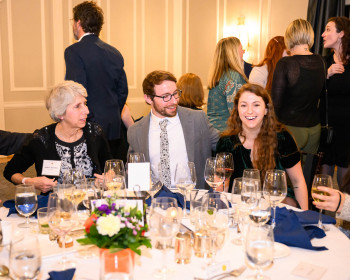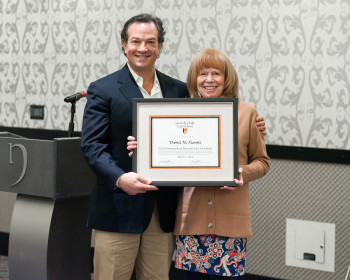International Externships Offer Unparalleled Experience for Law Students
Open gallery

Lewis & Clark offers a plethora of externship opportunities, including those that provide academic credits and a carefully supervised, well-crafted work experience. They are part of many law students’ practical training and can be done internationally.
Lewis & Clark believes that it can accomplish a number of educational objectives when it allows students to study law abroad. Studying law abroad includes doing an externship or taking courses at qualified overseas institutions approved by Lewis & Clark, and with whom the school has negotiated a written memorandum of understanding allowing for student exchanges.
Lewis & Clark Law students Alex Henson, 2L, Jocelyn Phares 2L, and Tess Jacobsen, 3L, and Anne Cox, 2L, traveled overseas for externship opportunities last summer in New Zealand, South Africa, and Cambodia. Collectively, they took part in projects in humanitarian law, fisheries management, and land use policy.
Alex Henson worked on mining-related cases in the Land and Housing department of Lawyers for Human Rights, an NGO in South Africa. She primarily did research and drafting, occasionally helped with client consultations, met with mining communities, and appeared in court.
On her first day there, the Land and Housing team had a case at the Constitutional Court and was doing oral arguments, so Henson was able to tag along. The decision was handed down in late October and was a big win for communities affected by mining, setting the precedent that informal land rights owners “cannot be deprived of their rights to land without consent or expropriation.”
She found the practical experience extremely rewarding. “The added bonus of doing an international internship was that I was using a foreign legal system,” Henson said. “I got to see how the law works outside of the US, giving me a perspective that I couldn’t have achieved without having an international internship.”
Henson discovered the opportunity through a friend she made at Lawyers for Human Rights when she studied abroad in South Africa during her undergraduate program.
Jocelyn Phares traveled to Wellington, New Zealand and worked on three fisheries management projects for the World Wildlife Fund (WWF). She drafted the WWF-NZ position statement for the 2018 annual meeting of the Scientific Committee for the Western Pacific Fisheries Commission (WCPFC), assisted in-house counsel with a legal review of a threat management plan for the endangered Māui’s Dolphin, and began a legal analysis of how unmanned aerial vehicles (UAVs) are being used to fight illegal, unreported, and unregulated fishing.
“I had a first-hand view of how multilateral environmental goals are accomplished, and the important role NGOs play in achieving those goals,” Phares said. “After this experience, I discovered that protecting our oceans and marine life is an issue I am passionate about.”
She discovered the opportunity to work under alum and WWF’s Tuna Programme Manager Alfred “Bubba” Cook ’03 through Professor Chris Wold, when they discussed her plans to travel to New Zealand for the summer.
“Lewis & Clark provides its students with an incredible lifelong community, and it is just one of the reasons I am so proud to pursue my legal education here,” Phares said.
Tess Jacobsen worked under Brian Rohan, a US advisor to the first public interest law firm in Cambodia, Vishnu Law Group. During her time there, she analyzed Cambodian policies, laws, and regulations for compliance with the Cancun Safeguards under the UN REDD+ program. She also worked on a handbook for fostering partnership between attorneys and local communities in land rights cases.
“I got to experience what a US attorney can do in a foreign country in the environmental field,” Jacobsen said. “Ultimately, this externship directed and clarified my future career goals.”
Jacobsen appreciated the opportunity to use the skills she’d been learning in legal research classes, but she found the merging of cultures most valuable. “As the world becomes more global I think it is important to have experience working with people of different cultures.”
After she expressed interest in applying for externships abroad, Professor Bob Klonoff put Jacobsen in contact with Cambodian contacts he has at the Royal University for Law and Economics.
One of her most memorable moments was when she took a van from the Mondulkiri province down to Kratie to see the Irrawaddy Dolphins “I could not communicate where I needed to them to drop me off, so they ended up dropping me off at this random hotel in Kratie and I had to walk about three miles to get to my hotel,” Jacobsen said. “Thank goodness for international phone plans and google maps!”
Anne Cox journeyed to Phnom Penh, Cambodia, where she worked at the Center for Humanitarian Law at the Royal University for Law and Economics. She had an intensely focused research placement, writing a manual on humanitarian law for non-attorneys’ benefit, including for the benefit of policymakers.
“The idea was to help everyone, especially decision-makers in the country, understand and codify basic principles of, and the consequences of not following, humanitarian law.”
Like Jacobsen, Professor Bob Klonoff had suggested this opportunity to her. After Cox completed the comparative law program at Peking University in China, the Center in Phnom Penh was eager to hire her.
“I felt lucky that they would teach me, spend time with me, take an interest in me, and share their history with me, all with grace and genuine kindness,” Cox said. “They went out of their way to make me feel appreciated.”
During her third week there, Cox broke her ankle and had to spend the remainder of her time in Cambodia on crutches. “It was difficult to get around on crutches, but it was yet another way that I was humbled,” Cox said. “People went out of their way to help me get in and out of tuk-tuks, to pick up my crutches when they loudly (and embarrassingly) fell over at restaurants, and even just to be sure I had enough space as I went to and fro on the street.”
Law Communications is located in room 304 of Legal Research Center (LRC) on the law Campus.
MSC: 51
email jasbury@lclark.edu
voice 503-768-6605
Cell: 626-676-7923
Assistant Dean,
Communications and External Relations, Law School
Judy Asbury
Law Communications
Lewis & Clark Law School
10101 S. Terwilliger Boulevard MSC 51
Portland OR 97219


